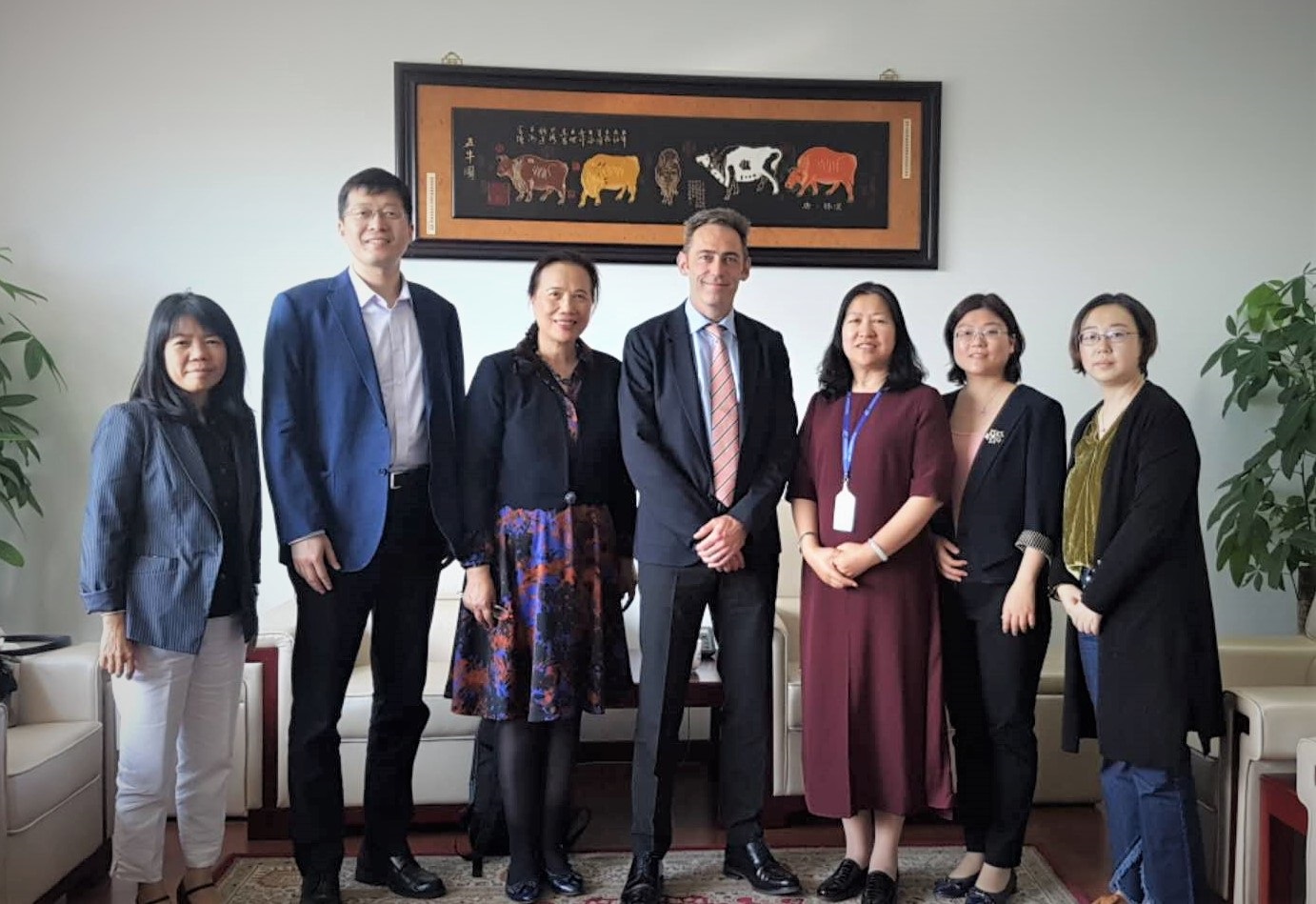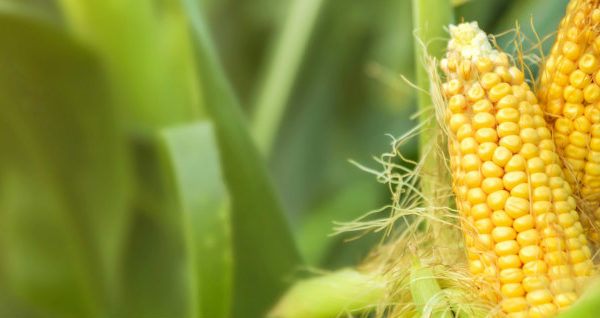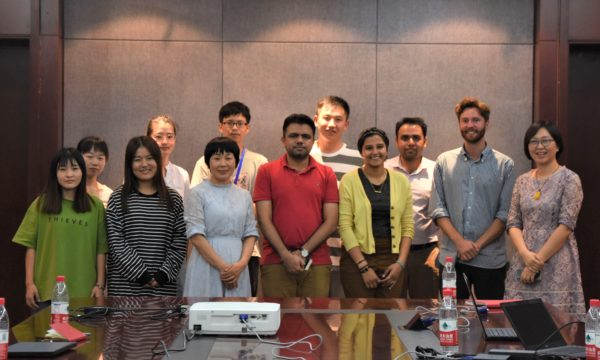
CABI’s publishing business has been busy strengthening partnerships in China by showcasing the benefits of its range of print and online products and services to Chinese clients and partners, and exploring opportunities of further collaboration with the Chinese Academy of Agricultural Sciences (CAAS) in Beijing.
Dr Andy Robinson, CABI’s Managing Director, Publishing, led a delegation from CABI who outlined the organisation’s new publishing strategies and development plans – including the forthcoming launch of the new CABI Agricultural and Bioscience open access journal – to members of the Agricultural Information Institute (AII) and Institute of Plant Protection (IPP) of CAAS as well as library staff from the China Agricultural University and China Farmer University.
The discussions with colleagues from CAAS’s headquarters and attendance at the China’s National Conference on Innovative Services of Agricultural Information Resources, helped the CABI delegation to better understand the information needs of Chinese agricultural research, education and extension services.
Dr Robinson, who gave a seminar entitled “Plant Protection: research, learning and practice” to a group of plant protection researchers and students at IPP in Beijing, said, “CABI’s knowledge business is vital to the organisation’s financial stability and contributes to our mission of helping to improve people’s lives worldwide. We do this by providing the very latest information across both print and online platforms while applying scientific expertise in the field to solve problems in agriculture and the environment.
“We recognise that our core publishing business needs to respond to the knowledge needs of our stakeholders and customers effectively while adopting innovation and high efficiency in our operations. In this way we are better placed to respond and contribute to global food security and sustainable development.
“China is probably the largest public funder of research and development in agriculture in the world. So, it is obviously important that we understand the needs and priorities of our partners, and collaborate to help China grow more nutritious food with less environmental impact.”

CABI delegates in China.
Dr Robinson added that the planned CABI Agricultural and Bioscience Open Journal is an exciting new development which will help disseminate the latest in global research and help promote open science worldwide.
CABI’s links with China began in early 1980s when AII-CAAS started to supply Chinese agricultural literature to CABI’s world-leading agricultural database of research – CAB Abstracts. This long-term collaboration enhanced CAB Abstracts’ coverage of Chinese literature and promoted the world-wide dissemination of Chinese research output.
The relationship with China reached a major milestone, between 1992 and 1995, with an agreement to collaborate on a national agricultural information project for China funded by the Asian Development Bank (ADB).
This project sought to upgrade Chinese agricultural information services providing 34 Chinese institutions with access to CAB Abstracts. This enabled Chinese researchers to keep abreast of the latest global research results and in 1996 led to the organisation of consortia purchases of CAB Abstracts after ADB’s funding ended.
Dr Qiaoqiao Zhang, CABI’s Director of Memberships, who was responsible for leading the organisation’s China programme from 1991 to 2010, said, “Collaboration between CABI and China, in the area of publishing and information management, over the past 30 years has been diverse.
“It has included the abstracting arrangement, organised consortia for the purchase of CAB Abstracts and Crop Protection Compendium, reviews in Chinese of CABI’s books and in-country reprinting of abstract journals in China.
“The partnership has also seen the co-publishing of a Chinese journal into English, translations rights deals for CABI books, the provision of access to CABI e-books through several Chinese agencies, and capability building of Chinese information specialists in information management through workshops and conferences, some of which are still on-going.”
Dr Zhang added that the collaboration with All-CAAS, between 1980 and 1990, contributed greatly to the realisation of China’s membership of CABI in 1995. It also resulted in the Strategic Review on the China-CABI partnership in 2006-7 which was instructed by the Chinese Ministry of Agriculture and Rural Affairs (MARA) and led by AII-CAAS in collaboration with CABI. From this came the Joint Laboratory for Biosafety between the MARA and CABI, which has proved a great success through more than 10 years’ implementation.
“China has a large professional and technical workforce involved in agricultural research, education and extension, with extensive information support services,” Dr Zhang said. “These present us with good opportunities to strengthen our partnership with China in the areas of publishing, and information and knowledge management and delivery.”
The Joint Lab has increasingly resulted in the implementation of projects with components involving information and knowledge management and evidence-based analysis.
Dr Feng Zhang, Regional Director, CABI East Asia, said, “The implementation of Plantwise, including the Knowledge Bank, for example, has been a significant element of our collaboration through the working of the Joint Lab.
“Using the data from CABI information products and other sources, we have been able to further research on the prevention, control and potential trade impacts of major crop pests and diseases along the Belt and Road countries and implement a project – under the Newton Agri-tech Programme – which integrates multi-source information to support decision making in the sustainable management of insect pests and diseases.
“Such opportunities and synergies could be pursued in a more active way as part of our future collaboration.”
As well as Dr Robinson’s presentation at the IPP, Dr Qiaoqiao Zhang, supported by Mrs Lina Yip, Regional Sales Manager, and Dr Wan Min, Project Co-ordinator, gave a talk at China’s National Conference on Innovative Services of Agricultural Information Resources on the role of ICTs and knowledge in global food security.
Additional Information
Related News & Blogs
Transforming agriculture with drones: empowering youths for a sustainable future
On this UN World Youth Skills Day 2023 (Saturday, 15 July), we celebrate the transformative power of skill development in shaping the lives of young individuals and creating a brighter future, writes Violet Ochieng’ – winner of the Carol Ellison Scienc…
14 July 2023




